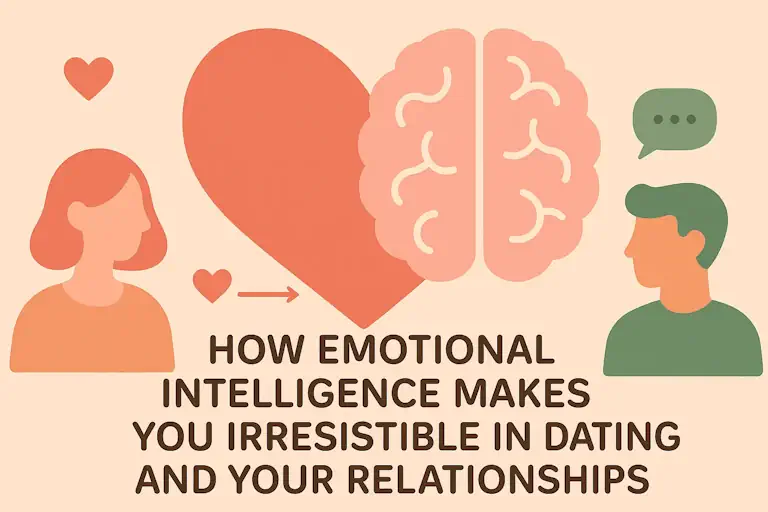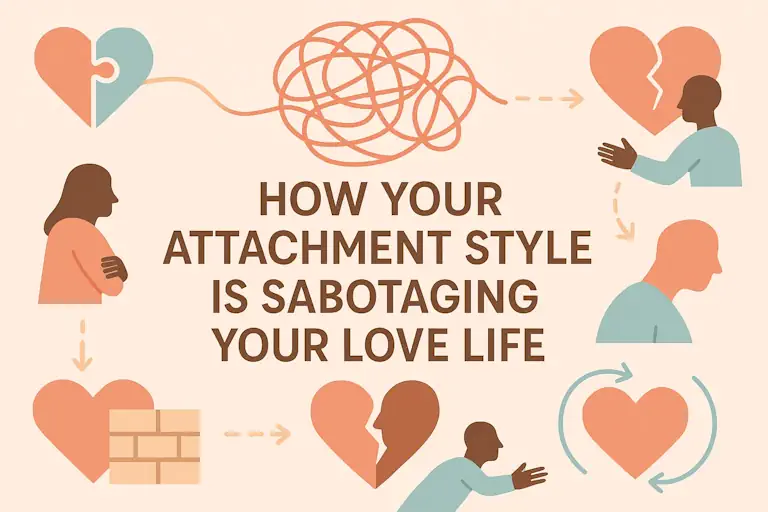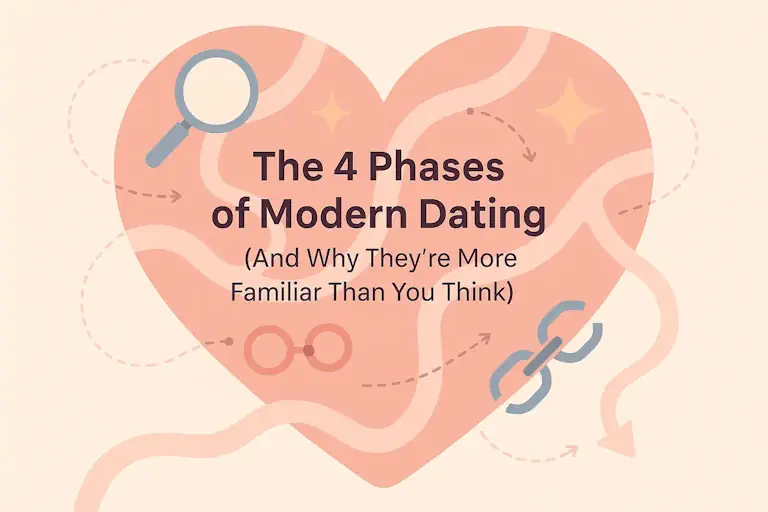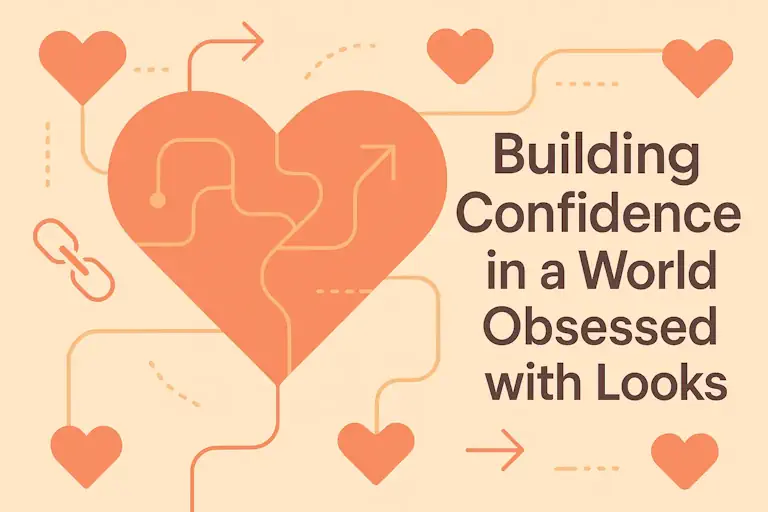Dating is weird. One day, you're spiraling because someone ghosted you after three weeks of texting like you were soulmates. The next, you're panic-Googling "How to flirt without sounding like a TED Talk." But underneath all the dating chaos, there's one underrated trait that quietly changes everything: emotional intelligence.
Table of Contents
What is Emotional Intelligence, Really?
It's basically being able to name your feelings without needing a crisis or a therapist to spell them out for you. But to get a little nerdy for a second:
Psychologist Daniel Goleman (he kind of pioneered the idea) broke emotional intelligence down into five key elements[1]:
- Self-awareness – Knowing what you're feeling and why.
- Self-regulation – Not losing it every time something annoys you.
- Motivation – Doing the hard emotional work even when it sucks.
- Empathy – Actually getting how someone else feels.
- Social skills – Handling conflict and connection without starting a fight or emotionally shutting down.
It's the kind of intelligence that doesn't show up on a résumé, but you know it when you see it in someone. They ask thoughtful questions. They listen without interrupting. They don't make your nervous system feel like it needs a Red Bull and a prayer.
Did You Know?
According to a study in the Journal of Personality and Social Psychology, people with higher emotional intelligence report significantly more satisfaction in their romantic relationships than those with lower EQ. In fact, EQ is a stronger predictor of relationship success than even IQ or physical attraction[4].
How It Shows Up in Dating (And Why It's So Attractive)
Let's be honest - most of us have dated someone who looked amazing on paper. Hot, funny, decent job, maybe even used the word "vulnerable" in a sentence. But then they react to conflict by ghosting or turning into a stone wall with a pulse.
Meanwhile, someone with emotional intelligence might not be perfect (spoiler: no one is), but they do these subtle, game-changing things:
- They ask questions that show they're actually present. Like "What was that like for you?" instead of just "So what do you do?"
- They know how to apologize without turning it into a TED Talk about their trauma.
- They can handle disagreement without turning into a defensive baby.
- They pay attention to how you feel, not just how you make them feel.
You start to feel safe with them. And safe, despite what Hollywood taught us, is actually really sexy when you're not 22 and just chasing chaos.
"The most attractive quality in a person is how they make you feel. Someone with emotional intelligence creates a space where you feel seen, understood, and valued."- Dr. John Gottman, Relationship Researcher[3]
EQ in Long-Term Relationships
If emotional intelligence is attractive in dating, it becomes essential in relationships.
Because eventually, the initial dopamine rush fades. You'll argue. You'll say things you regret. Someone will get insecure, or bored, or overwhelmed. Emotional intelligence is what keeps the relationship from going up in flames the moment someone forgets an anniversary or goes quiet for a day.
Examples from my life:
- One partner used to freak out every time I needed space. They'd assume I didn't care. It turned into a loop of me pulling away and them chasing harder.
- My current relationship? When I said "I need a little alone time," they literally said, "Thanks for telling me. Let me know when you're ready to reconnect."
I'm telling you, emotional intelligence is the difference between a breakup spiral and a healthy boundary.
When You Don't Have It (Spoiler: We've All Been There)
Let me just say this: no one starts out emotionally intelligent. You learn it the hard way.
You might recognize some of these signs you've still got work to do (I did):
- You overanalyze every text because you can't tell how you feel, let alone them.
- You shut down in arguments because feelings = overwhelming.
- You take everything personally, especially when they're having a bad day.
- You think you're being chill, but really you're just emotionally unavailable with a filter.
And let's not forget the holy grail of low EQ dating: expecting your partner to guess what's wrong, instead of just saying it out loud. (Guilty.)
Take Action: Test Your EQ
Take our emotional intelligence quiz to understand where you stand and get personalized tips for improving your relationship skills.
How to Build Emotional Intelligence (Without Reading 12 Self-Help Books)
Okay, so we know it's important. But how do you actually build emotional intelligence? Especially if therapy isn't accessible right now?
Here's what helped me - and people I've worked with:
- Practice emotional vocabulary
If the only feelings you can name are "fine" and "stressed," we have work to do. Try journaling with emotional check-ins. Use an emotion wheel. Literally Google "different kinds of emotions." Yes, it's awkward. Do it anyway[2]. - Pause before reacting
This sounds small, but it's massive. That 5-second pause between feeling something and blurting it out? That's where EQ lives. Take a breath. Ask yourself what you're really feeling. - Be curious instead of judgmental
Your partner is pulling away? Instead of spiraling, try: "Hey, I noticed you've been quiet lately - want to talk about it?" Curiosity opens doors. Judgment slams them shut. - Learn how to apologize
An emotionally intelligent apology isn't "Sorry you're upset." It's "I get how my actions hurt you - and I want to do better." (Also, don't make it about your pain. No one wants to comfort the person who hurt them.) - Let people see the messy bits
This might be the scariest one. But showing up with emotional honesty - "Hey, I'm nervous," "I'm afraid of losing you," "I want to be better at this" - makes you magnetic in a way no dating app photo ever could.
Final Thoughts: Emotional Maturity Is Hot
Attraction isn't just about looks or witty banter. It's about feeling safe, seen, and emotionally met.
If you're constantly wondering why your dating life feels like a loop of short connections and emotional confusion, working on your emotional intelligence might just be the unlock you didn't know you needed.
It won't make dating perfect. But it will make it real. And that's where the actual magic happens.
Need some real-world examples or want to dig deeper? Check out our other post on attachment styles for a more holistic dating glow-up. You got this.
Reader Stories
"Learning to pause before reacting changed my entire dating experience. Before, I'd get defensive at the slightest critique. Now I take a breath, acknowledge my feelings, and respond thoughtfully. My current relationship is the healthiest I've ever had because we can actually talk through issues."
"I used to be the queen of 'I'm fine' when I was actually upset. Working on my emotional vocabulary helped me communicate what I actually need in relationships instead of expecting my partner to be a mind reader. It's like we're finally speaking the same language."
Frequently Asked Questions: Emotional Intelligence
Can emotional intelligence be learned?
Absolutely. While some people naturally have higher emotional intelligence, it's definitely a skill that can be developed. The brain pathways involved in emotional awareness and regulation can be strengthened through consistent practice. Research shows that targeted EQ training programs can increase emotional intelligence by 25% or more. The key is consistent self-awareness practice, learning to identify emotions in yourself and others, and developing better emotional regulation strategies.
How does emotional intelligence differ from regular intelligence?
Traditional intelligence (IQ) measures cognitive abilities like logical reasoning, problem-solving, and knowledge retention. Emotional intelligence (EQ) focuses on the ability to recognize, understand, manage, and influence emotions - both your own and others'. While IQ helps with technical skills and abstract thinking, EQ determines how well you navigate social complexities, manage relationships, and make decisions under emotional pressure. Research suggests that while IQ can help you get in the door for a job or relationship, EQ is what helps you thrive once you're there.
What are some signs of low emotional intelligence in dating?
Common signs include difficulty naming feelings beyond basic emotions like "good" or "bad," frequent misunderstandings in communication, defensiveness when receiving feedback, inability to see situations from a partner's perspective, emotional outbursts or shutdowns during conflict, struggling to apologize sincerely, and making everything about themselves. Low EQ can also manifest as constantly needing reassurance without being able to provide it to others, or inability to distinguish between different emotional needs (like wanting space versus wanting support).
Can having high emotional intelligence compensate for other relationship challenges?
High emotional intelligence can certainly help navigate many relationship challenges, including differing communication styles, life stressors, and personal differences. It provides tools for effective conflict resolution, empathetic understanding, and maintaining connection during difficult times. However, emotional intelligence isn't a magic solution for fundamental incompatibilities in values, life goals, or persistent harmful behaviors. The greatest value of EQ in relationships is that it helps you identify which challenges are workable through better communication versus which ones might signal deeper incompatibility.
References
- Goleman, D. (1995). Emotional Intelligence: Why It Can Matter More Than IQ. New York: Bantam Books.
- Mayer, J. D., & Salovey, P. (1997). What is emotional intelligence? In P. Salovey & D. Sluyter (Eds.), Emotional development and emotional intelligence: Educational implications (pp. 3-31). New York: Basic Books.
- Gottman, J., & Silver, N. (2015). The Seven Principles for Making Marriage Work. New York: Harmony Books.
- Brackett, M. A., Rivers, S. E., & Salovey, P. (2011). Emotional intelligence: Implications for personal, social, academic, and workplace success. Social and Personality Psychology Compass, 5(1), 88-103.
 The Modern Dater
The Modern Dater




